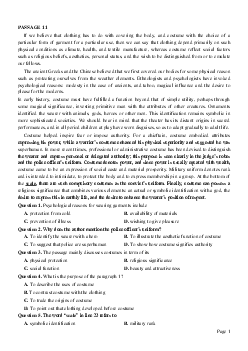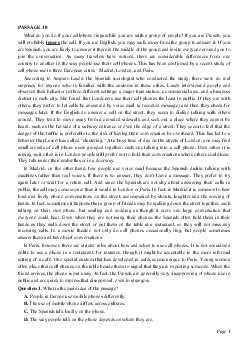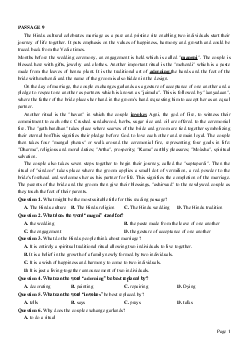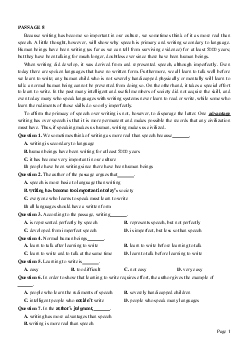



Preview text:
PASSAGE 31
With exams approaching, you should be thinking about how to get better at time management and
organize your days so you can strike the right balance between home, work and university life. You
should also try and eat some brain food - and no, we don't mean crisps and energy drinks!
By taking the time to arrange your priorities, you can give yourself the best chance of staying on track
and organized during the exam period, which in turn can help reduce stress levels, something that can be
the difference between success and failure at university.
Take a look at our top seven time management tips, so that you can do your best at university and also
find moments to relax and even earn some money on the side.
First and foremost, allow time for planning to avoid repetition. Taking the time to research, plan and think
about your work is crucial for good time management. Allow yourself the time to process new
information and plan how you are going to use it, as this can help you to avoid having to re-read and
repeat any research. One way of effectively planning before researching is to make a list of everything
you want to find out, so that you can make notes below each subheading as you go.
Secondly, avoid procrastination and distraction One way to avoid procrastination is to think about the
different places you have been when studying – where were you the most focused? Where were you most
distracted? Is there anything you can do to make studying actually somewhat enjoyable? Remember, what
works for one person might not necessarily work for you. For some, studying with friends can limit their
productivity. But for others, studying in groups can help to increase motivation and avoid procrastination.
Next, exercise to clear your head in between study sessions. Believe it or not, exercise works in the same
way sleep does. It can focus your state of mind, helping you to clear your head and boost your brain
power in between study sessions. If you’re new to exercise, aim to fit in a 10-minute run here and there,
steadily increasing the amount you do as you go on.
Finally, ask yourself the question, “Has your organization been effective?”. Constantly reviewing and
reassessing your schedule can help you to recognize whether you need to make any changes in order to
help you complete any university tasks and also have time to relax and spend time with friends and family.
Question 1. According to the passage, what is NOT regarded as brain food? A. Fruit B. Meat C. Vegetables D. Crisps
Question 2. Who is most likely the target reader of this passage?
A. An English teacher B. A primary-school pupilC. A university student D. A college manager
Question 3. What is NOT mentioned as a benefit of following these tips?
A. Getting high scores B. Learning effectively C. Saving money D. Having leisure time
Question 4. According to the passage, part of time management process is . A. planning B. reading C. writing D. speaking
Question 5. One important aspect of planning for studying is . A. a study place B. pair-work C. group-work D. study equipment
Question 6. It should be remembered that everyone is . A. active B. similar C. different D. friendly
Question 7. What benefit of exercise is NOT mentioned ? Page 1
A. Refreshing the mindB. Getting sound asleep C. Focusing on study D. Thinking clearly
Question 8. It’s important to keep your timetable. A. repeating B. repairing C. replacing D. reviewing ĐÁP ÁN 1-D 2-C 3-A 4-A 5-A 6-C 7-B 8-D
LỜI GIẢI CHI TIẾT Question 1: D
Theo đoạn văn, những gì KHÔNG được coi là thực phẩm não? A. Trái cây B. Thịt C. Rau quả D. Crisps
DẪN CHỨNG: You should also try and eat some brain food - and no, we don't mean crisps and energy drinks!
DỊCH: Bạn cũng nên thử và ăn một số thực phẩm bổ não - và không, chúng tôi không chỉ định là đồ uống
giòn và nước tăng lực. Question 2: C
Người có khả năng là độc giả cho bài văn này là
A. Một giáo viên tiếng Anh
B. Một học sinh tiểu học
C. Một sinh viên đại học
D. Một quản lý đại học
DẪN CHỨNG: With exams approaching, you should be thinking about how to get better at time
management and organize your days so you can strike the right balance between home, work and university life.
DỊCH: Khi kỳ thi đang đến gần, bạn nên suy nghĩ về cách làm thế nào để quản lý thời gian tốt hơn và sắp
xếp ngày của bạn để bạn có thể đạt được sự cân bằng giữa cuộc sống gia đình, công việc và trường đại học. Question 3: A
Điều gì KHÔNG được đề cập như một lợi ích của việc làm theo những lời khuyên này? A. Đạt điểm cao B. Học tập hiệu quả C. Tiết kiệm tiền
D. Có thời gian giải trí
DẪN CHỨNG: B: Secondly, avoid procrastination and distraction One way to avoid procrastination is to
think about the different places you have been when studying.
C: Take a look at our top seven time management tips, so that you can do your best at university and also
find moments to relax and even earn some money on the side.
D: Finally, ask yourself the question, “Has your organization been effective?”. Constantly reviewing and
reassessing your schedule can help you to recognize whether you need to make any changes in order to
help you complete any university tasks and also have time to relax and spend time with friends and family.
DỊCH: B: Thứ hai, tránh sự chần chừ và mất tập trung Một cách để tránh sự trì hoãn là suy nghĩ về những
nơi khác nhau mà bạn đã từng đến khi học. C: Hãy xem bảy lời khuyên quản lý thời gian hàng đầu của Page 2
chúng tôi, để bạn có thể cố gắng hết sức ở trường đại học và cũng tìm thấy những giây phút thư giãn và
thậm chí kiếm được một số tiền ở bên.
D: Cuối cùng, hãy tự hỏi mình câu hỏi, tổ chức của bạn có hiệu quả không? Liên tục xem xét và đánh giá
lại lịch trình của bạn có thể giúp bạn nhận ra liệu bạn có cần thực hiện bất kỳ thay đổi nào để giúp bạn
hoàn thành bất kỳ nhiệm vụ đại học nào và cũng có thời gian để thư giãn và dành thời gian với bạn bè và gia đình. Question 4: A
Theo đoạn văn, một phần của quy trình quản lý thời gian là . A. lập kế hoạch B. đọc C. viết D. nói Question 5: A
Một khía cạnh quan trọng của việc lập kế hoạch học tập là . A. nơi học tập B. làm việc theo cặp C. nhóm làm việc D. thiết bị học tập
DẪN CHỨNG: One way of effectively planning before researching is to make a list of everything you
want to find out, so that you can make notes below each subheading as you go.
DỊCH: Một cách lập kế hoạch hiệu quả trước khi nghiên cứu là lập danh sách mọi thứ bạn muốn tìm
hiểu, để bạn có thể ghi chú bên dưới mỗi phân nhóm khi bạn đi. Question 6: C
Cần nhớ rằng tất cả mọi người là . A. hoạt động B. tương tự C. khác biệt D. thân thiện
DẪN CHỨNG: Finally, ask yourself the question, “Has your organization been effective?”
DỊCH: Cuối cùng, hãy tự hỏi mình câu hỏi, tổ chức của bạn có hiệu quả không? Question 7: B
Những lợi ích của tập thể dục KHÔNG được đề cập? A. Làm mới tâm trí B. Ngủ ngon
C. Tập trung vào học tập D. Suy nghĩ rõ rang
DẪN CHỨNG: Next, exercise to clear your head in between study sessions. Believe it or not, exercise
works in the same way sleep does. It can focus your state of mind, helping you to clear your head and
boost your brain power in between study sessions. If you’re new to exercise, aim to fit in a 10-minute run
here and there, steadily increasing the amount you do as you go on.
DỊCH: Tiếp theo, tập thể dục để giải tỏa đầu giữa các buổi học. Dù bạn có tin hay không, tập thể dục
cũng có tác dụng giống như giấc ngủ. Nó có thể tập trung trạng thái tâm trí của bạn, giúp bạn giải tỏa đầu
óc và tăng sức mạnh não bộ giữa các buổi học. Nếu bạn mới tập thể dục, hãy tập thể dục trong 10 phút ở
đây và ở đó, tăng dần số lượng bạn làm khi bạn tiếp tục. Question 8: D
Rất quan trọng để liên tục
thời gian biểu của bạn. A. lặp lại B. sửa chữa C. thay thế D. xem xét
DẪN CHỨNG: Constantly reviewing and reassessing your schedule can help you to recognize whether
you need to make any changes in order to help you complete any university tasks and also have time to
relax and spend time with friends and family. Page 3
DỊCH: Liên tục xem xét và đánh giá lại lịch trình của bạn có thể giúp bạn nhận ra liệu bạn có cần thực
hiện bất kỳ thay đổi nào để giúp bạn hoàn thành bất kỳ nhiệm vụ đại học nào và cũng có thời gian để thư
giãn và dành thời gian với bạn bè và gia đình. Page 4




